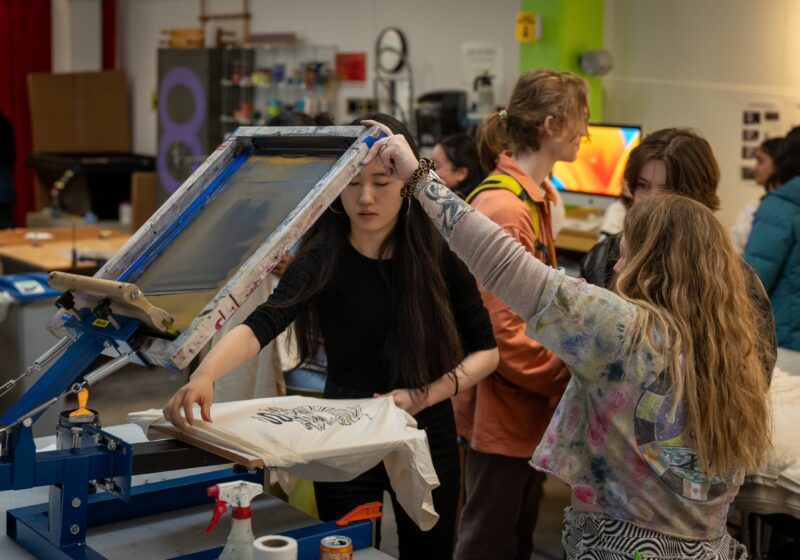The Chinese Students’ Association (CSA) hung up posters and painted the tunnels to advertise its annual China Nite on Feb. 3. Within the next few days, the posters were torn down and ‘Free Tibet” was spray-painted in six-foot-tall letters over the tunnel painting. Facilities quickly responded by painting over the defacement.
CSA met with the College Diversity Roundtable to discuss the issue; their discussion included finding ways to deter future occurrences.
The task force presented an open forum to discuss campus climate issues and serves as a tool for promoting diversity as well as finding solutions to diversity-related issues.
CSA President and senior Michael Chen emphasized that the club is a not a political group, but rather a cultural one aimed at establishing active relations with the UR community.
For example, China Nite, which is a yearly event held by the CSA to celebrate the Chinese New Year, includes a celebration of both modern and traditional Chinese dance performances.
‘We expressed our concerns about how we could use strong support to show how CSA is not a political group, and that this really hurts us and our cause,” he said. ‘Our goal was to express cultural awareness, not to bring this whole political side into it.”
As a means of preventing defiling forms of expression, CSA feels its best move is to reach out to students to show the true nature of the club.
As a collaboration of all Asian and cultural clubs, Asian Awareness Month will be held in April and will feature cultural fairs and shows.
‘Ultimately for us, we really hope our efforts will show that our club is cultural and it is meant for everyone,” Chen said. ‘We don’t want to discriminate [against] anyone, and we’re completely open to people having their own opinions. We just didn’t appreciate [the China Nite incident] because people put a lot of hard work into it. We feel that the attack was a low blow and insulted their hard work.”
Speaker of the Students’ Association Senate and senior Kierstin Hughes was present at the Roundtable meeting and was able to hear CSA’s claims. On March 23, the student government passed a motion on behalf on the SA and the Senate that was prompted by the event.
‘We passed a resolution that restated our support for our own non-discrimination clause in the SA Constitution that holds for the entire student body,” Hughes said. ‘We also reaffirmed our support in the school’s communal principles that say we shall respect each other and no person in the University community should ever feel threatened. We’re extremely tolerant of free speech, but there’s a line where it’s anti-speech instead of free-speech.”
Dean of Students Matthew Burns attended China Nite’s performance and was impressed with the hard work and effort that was put into the show, which consequently made him unhappy to hear of the debasement of China Nite’s advertisements.
‘My reaction was that I was disappointed and discouraged,” he said in reaction to the advertisement’s defacements. ‘I tend to think of UR students as generally bright, open-minded, inquisitive people, and I often brag about them when it comes to the support you demonstrate to each other, especially when it comes to your performances. It saddens me to think that some person or persons on campus think so little of their peers’ efforts to deface posters advertising the show.”
The perpetrators have yet to be identified in the case.
Across the country, various university events have prompted discussion regarding racial and/or cultural assault.
Some of these events became crucial to the incident with China Nite. More specifically, the University of Oregon formally rebuked the Pacifica Forum on March 22.
The Pacifica, an Oregon-based group, denies the Holocaust and harbors blunt opinions of women and rape. According to the Southern Poverty Law Center, which dubs the forum a hate group, the Pacifica has created a threatening environment due to its white supremacy views.
The university’s senate denounced the group as a part of its student union following a formal hearing at which students were able to express their views.
‘The first week I brought up the story at Senate, the Pacifica Forum had used hate speech on [the University of Oregon] campus and yelled at students and were really intolerant,” Hughes said. ‘The next week was when they put the swastika on the floor of the LGBT office. It was a brave position to take, to say they weren’t going to tolerate that sort of thing in their building. It was a huge deal, and I wanted our Senate to know that this does happen, so they could think about how important our job is here.”
SA Deputy Speaker and sophomore Dan Cohn highlighted the Senate’s role as an advocate for students and as a promoter of expression.
‘The University of Oregon wasn’t prohibiting speech,” Cohn said. ‘We, like they, are for free speech, but with limitations: limitations that protect the community and those who have free speech. I think it goes without saying that all free speech requires mutual respect as do all rights.”
Ostrander is a member of the class of 2013.




